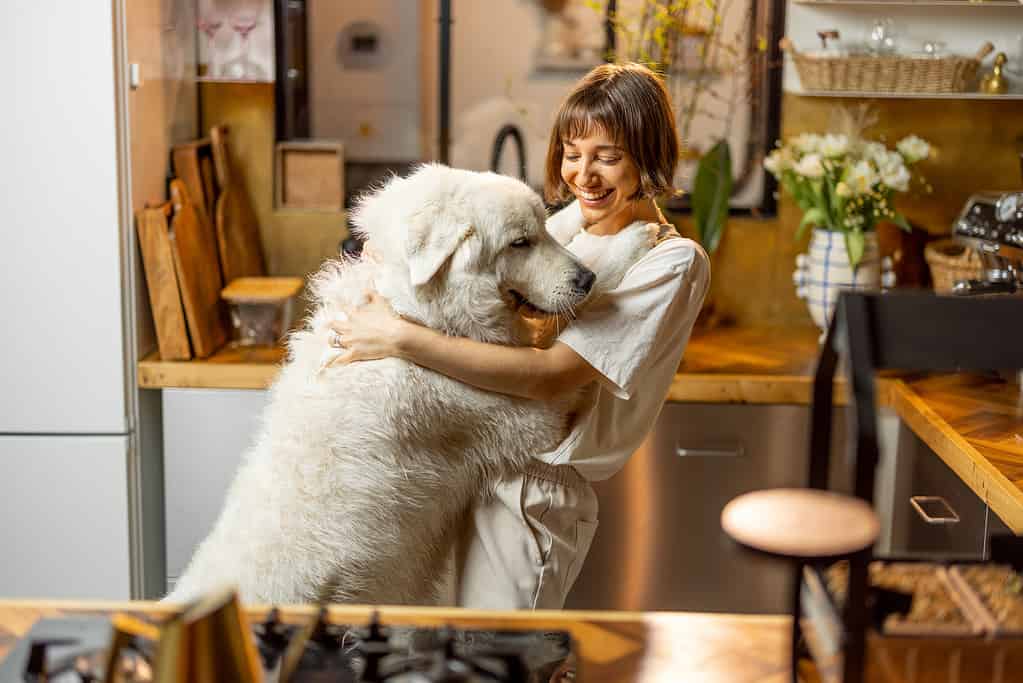Humans are constant thinkers. Therefore, some of our thoughts can lead to constant worry. Once constant worry has disrupted our daily lives, we may need some extra help. When talk therapy, breathwork, and other holistic ways to reduce anxiety, we may need some help from a prescription.
Similar to humans, our dogs can experience unbearable separation anxiety. If you have tried behavior training and holistic therapies such as CBD and still face destructive behavior in your dog, it may be time to consider medicinal assistance.
In this article, you’ll learn about the risks, benefits, and dosage of Prozac for dogs. Plus, you’ll discover if Prozac is the right medication for your pup.

Under no circumstances should you ever give Prozac prescribed for you to your dog.
©RossHelen/iStock via Getty Images
When Does Your Dog Need Prozac?
Dogs rely quite a bit on the socialization and interaction between their human and the dog. But, when a dog becomes so attached that they cannot respond to cues or commands because they are so focused on their owner, that is when a problem will begin.
For example, if your dog is used to you coming at 3 PM and suddenly your schedule changes, it may disrupt your dog’s schedule. Plus, this sudden change can startle and even traumatize your dog which is where behavior therapy comes in. However, when therapy does not prove to be effective, and they begin to destroy furniture, toys, and their crate, they may require some help from Prozac.
Prozac for dogs may also be able to help with the following:
- Fear of people
- Unwanted urination
- Fear of thunder
- Generalized anxiety
- Compulsive disorders
- Aggression

When therapy does not prove to be effective, and they destroy furniture, toys, and their crate, they may require some help from Prozac.
©smrm1977/ via Getty Images
Prozac Side Effects on Dogs
Drugs, in general, can cause adverse side effects, such as Prozac. This is why whenever you administer Prozac, whether through capsules, tablets, or liquid, it is crucial to monitor your dog. Some common side effects of Prozac for dogs include:
- Drowsiness
- Lack of desire to eat
- Vomiting
- Diarrhea
- Shivering
- Apprehensiveness
- Crying
- Stumbling
- Excessive drooling
- Weight loss
Severe Side Effects
In some rare cases, Prozac for dogs can cause deadpan side effects such as:
- Seizures
- Hostility
- Consistent regurgitation
If your canine expresses any of these side effects, it is best to get them to your veterinarian as soon as possible.

Watching your dog after administering Prozac is important to keep a close eye on their reaction.
©Astakhova/iStock via Getty Images
Signs of Prozac Overdose in Dogs
While there are mild and severe side effects to go along with Prozac, there could be the risk of overdose.
Signs of canine Prozac overdose include:
- Abnormal exhaustion
- Irritability
- Withholding from ingesting food
- Difficulty walking
- Quickened breathing
- Decreased cardiac rhythm
- Debilitation
If any of these signs are present in your dog, please seek help from your local vet immediately.
Risk Factors
You may want to discuss alternatives to Prozac if your dog has any of the following conditions:
- Seizure disorders
- Puppies 6 months of age or younger
- Has a known history of allergies to Prozac
- Is taking MAO inhibitors
- Specific medications and supplements that your dog is currently on
Additional Factors to Consider
Before putting your pup on Prozac, your vet will most likely give them a comprehensive exam to rule out any other issues that could be causing the anxiety. For example, if your dog has a torn ligament, this will create pain and anxiety in your dog.
Moreover, it may take a while before Prozac begins to work. In most cases, Prozac does not take full effect until your dog takes it for at least four weeks.
You also should avoid giving Prozac to any dog who is lactating or pregnant.

Prozac may not not take full effect until your dog has been taking it for at least four weeks.
©fotyma/iStock via Getty Images
Prozac for Dogs Dosage Chart
The following chart is meant to act as a guideline for your canine. Do not use it to self-medicate your dog. As mentioned before, Prozac should be prescribed by a veterinary professional.
| Weight in lbs. | Dosage in mg |
| 5 lbs | 2.5 mg |
| 10 lbs. | 5 mg |
| 15 lbs.. | 7.5 mg |
| 20 lbs.. | 10 mg |
| 25 lbs. | 12.5 mg |
| 30 lbs. | 15 mg |
| 35 lbs. | 17.5 mg |
| 40 lbs. | 20 mg |
| 45 lbs. | 22.5 mg |
| 50 lbs. | 25 mg |
Alternatives to Prozac for Dogs
If you are apprehensive about administering a prescription to your dog to help with anxiety, there are a few alternatives, such as:
- Behavior mitigation.
- Combining a professional trainer and Prozac has been proven to be a very effective method in treating canine anxiety.
- Consider alternatives to Prozac first. If your pup has developed anxiety over a specific time frame, it will take them that much time for the Prozac to work. For instance, if your dog developed anxiety over a year, it will take a year for the Prozac to take full effect.
Prozac for dogs can provide wonderful benefits in easing anxiety and aggression. However, it is always necessary to consult your local veterinarian first.

If you are apprehensive about administering a prescription to your dog to help with anxiety, there are a few alternatives, such as behavior mitigation.
©Fomich_off/Shutterstock.com
The photo featured at the top of this post is © Patryk_Kosmider/ via Getty Images
Ready to discover the top 10 cutest dog breeds in the entire world?
How about the fastest dogs, the largest dogs and those that are -- quite frankly -- just the kindest dogs on the planet? Each day, AZ Animals sends out lists just like this to our thousands of email subscribers. And the best part? It's FREE. Join today by entering your email below.
Thank you for reading! Have some feedback for us? Contact the AZ Animals editorial team.






